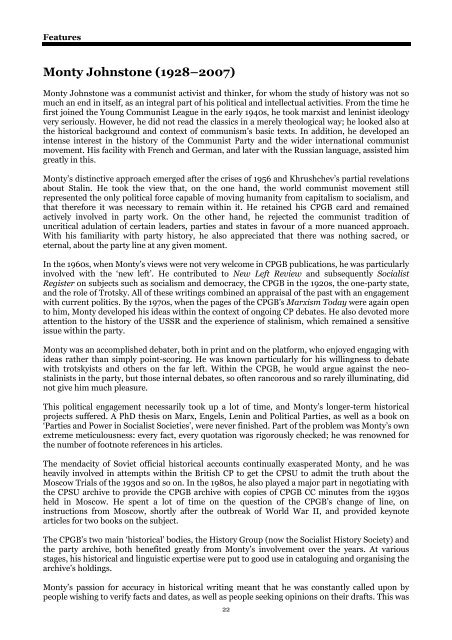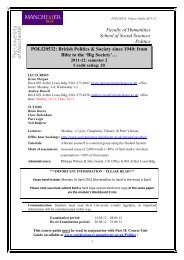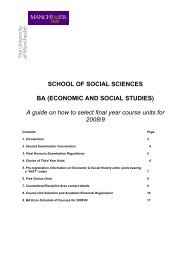CHNN 22, Spring 2008 - School of Social Sciences
CHNN 22, Spring 2008 - School of Social Sciences
CHNN 22, Spring 2008 - School of Social Sciences
You also want an ePaper? Increase the reach of your titles
YUMPU automatically turns print PDFs into web optimized ePapers that Google loves.
Features<br />
Monty Johnstone (1928–2007)<br />
Monty Johnstone was a communist activist and thinker, for whom the study <strong>of</strong> history was not so<br />
much an end in itself, as an integral part <strong>of</strong> his political and intellectual activities. From the time he<br />
first joined the Young Communist League in the early 1940s, he took marxist and leninist ideology<br />
very seriously. However, he did not read the classics in a merely theological way; he looked also at<br />
the historical background and context <strong>of</strong> communism’s basic texts. In addition, he developed an<br />
intense interest in the history <strong>of</strong> the Communist Party and the wider international communist<br />
movement. His facility with French and German, and later with the Russian language, assisted him<br />
greatly in this.<br />
Monty’s distinctive approach emerged after the crises <strong>of</strong> 1956 and Khrushchev’s partial revelations<br />
about Stalin. He took the view that, on the one hand, the world communist movement still<br />
represented the only political force capable <strong>of</strong> moving humanity from capitalism to socialism, and<br />
that therefore it was necessary to remain within it. He retained his CPGB card and remained<br />
actively involved in party work. On the other hand, he rejected the communist tradition <strong>of</strong><br />
uncritical adulation <strong>of</strong> certain leaders, parties and states in favour <strong>of</strong> a more nuanced approach.<br />
With his familiarity with party history, he also appreciated that there was nothing sacred, or<br />
eternal, about the party line at any given moment.<br />
In the 1960s, when Monty’s views were not very welcome in CPGB publications, he was particularly<br />
involved with the ‘new left’. He contributed to New Left Review and subsequently <strong>Social</strong>ist<br />
Register on subjects such as socialism and democracy, the CPGB in the 1920s, the one-party state,<br />
and the role <strong>of</strong> Trotsky. All <strong>of</strong> these writings combined an appraisal <strong>of</strong> the past with an engagement<br />
with current politics. By the 1970s, when the pages <strong>of</strong> the CPGB’s Marxism Today were again open<br />
to him, Monty developed his ideas within the context <strong>of</strong> ongoing CP debates. He also devoted more<br />
attention to the history <strong>of</strong> the USSR and the experience <strong>of</strong> stalinism, which remained a sensitive<br />
issue within the party.<br />
Monty was an accomplished debater, both in print and on the platform, who enjoyed engaging with<br />
ideas rather than simply point-scoring. He was known particularly for his willingness to debate<br />
with trotskyists and others on the far left. Within the CPGB, he would argue against the neostalinists<br />
in the party, but those internal debates, so <strong>of</strong>ten rancorous and so rarely illuminating, did<br />
not give him much pleasure.<br />
This political engagement necessarily took up a lot <strong>of</strong> time, and Monty’s longer-term historical<br />
projects suffered. A PhD thesis on Marx, Engels, Lenin and Political Parties, as well as a book on<br />
‘Parties and Power in <strong>Social</strong>ist Societies’, were never finished. Part <strong>of</strong> the problem was Monty’s own<br />
extreme meticulousness: every fact, every quotation was rigorously checked; he was renowned for<br />
the number <strong>of</strong> footnote references in his articles.<br />
The mendacity <strong>of</strong> Soviet <strong>of</strong>ficial historical accounts continually exasperated Monty, and he was<br />
heavily involved in attempts within the British CP to get the CPSU to admit the truth about the<br />
Moscow Trials <strong>of</strong> the 1930s and so on. In the 1980s, he also played a major part in negotiating with<br />
the CPSU archive to provide the CPGB archive with copies <strong>of</strong> CPGB CC minutes from the 1930s<br />
held in Moscow. He spent a lot <strong>of</strong> time on the question <strong>of</strong> the CPGB’s change <strong>of</strong> line, on<br />
instructions from Moscow, shortly after the outbreak <strong>of</strong> World War II, and provided keynote<br />
articles for two books on the subject.<br />
The CPGB’s two main ‘historical’ bodies, the History Group (now the <strong>Social</strong>ist History Society) and<br />
the party archive, both benefited greatly from Monty’s involvement over the years. At various<br />
stages, his historical and linguistic expertise were put to good use in cataloguing and organising the<br />
archive’s holdings.<br />
Monty’s passion for accuracy in historical writing meant that he was constantly called upon by<br />
people wishing to verify facts and dates, as well as people seeking opinions on their drafts. This was<br />
<strong>22</strong>
















